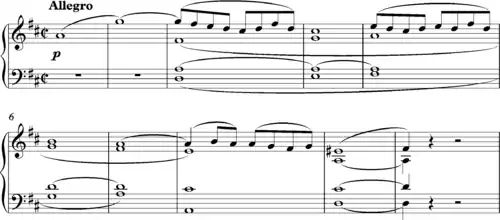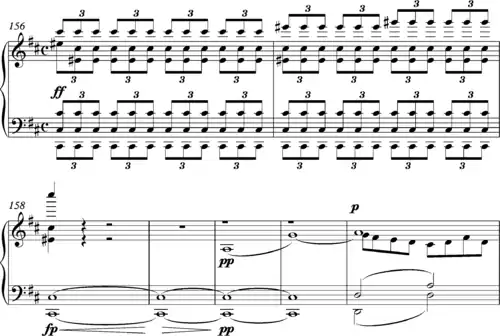| String Quartet | |
|---|---|
| No. 3 | |
| Early string quartet by Ludwig van Beethoven | |
.jpg.webp) Ludwig van Beethoven, c. 1796 | |
| Key | D major |
| Opus | 18, No. 3 |
| Composed | 1798–1800 |
| Dedication | Joseph Franz von Lobkowitz |
| Published | 1801 |
| Movements | Four |
The String Quartet No. 3 in D major, Op. 18, No. 3, was written by Ludwig van Beethoven between 1798 and 1800 and published in 1801, dedicated to Joseph Franz von Lobkowitz. Although it is numbered third, it was the first quartet Beethoven composed.
Analysis
It consists of four movements:
- Allegro (D major)
- Andante con motor (B-flat major)
- Menuetto Allegretto (D major)
- Presto (D major)
According to Steinberg, this is "the gentlest, most consistently lyrical work [within Beethoven's Op. 18]",[1] except for the fourth movement, in which "Beethoven first explores the idea of shifting the centre of gravity toward the end of a multimovement work".[2]
The first movement starts with a gentle and unassuming theme:

However, its return at the start of the recapitulation shows the theme in an entirely different light. Philip Radcliffe (1965, p. 24) describes this moment as “beautifully contrived”.[3] Burstein (1998, p. 295) describes the
dramatic and unusual harmonic progression at the end of the development section as “breathtaking”.[4]

“The sudden reinterpretation of the C♯ creates a type of tonal crisis which has deep structural ramifications for the entire movement. Beethoven’s brilliant manner of dealing with the implications of this unusual strategy indicates a debt to his teacher, Haydn, and also reveals much about Beethoven’s own craft and artistic vision”.[5] The final movement contains a theme that resembles the Mexican Hat Dance.
Notes
- ↑ Steinberg, p. 159
- ↑ Steinberg, p. 163
- ↑ Radcliffe, P. (1965) Beethoven’s String Quartets. London, Hutchinson.
- ↑ Burstein, L. P. (1998, p. 295) “Surprising returns: the VII# in Beethoven’s String Quartet Op. 18 No.3, and its antecedents in Haydn”. Music Analysis, 17/3 pp. 295-312.
- ↑ Burstein, L. P. (1998, p. 295) “Surprising returns: the VII# in Beethoven’s String Quartet Op. 18 No.3, and its antecedents in Haydn". Music Analysis, 17/3 pp. 295-312.
References
- Robert Winter, Robert Martin eds. (1994). The Beethoven Quartet Companion. University of California Press. ISBN 0-520-08211-7.; especially the essay by Michael Steinberg (pp. 159–163)
External links
- String Quartet No. 3: Scores at the International Music Score Library Project
- Performance of String Quartet no. 3 by the Borromeo String Quartet from the Isabella Stewart Gardner Museum in MP3 format